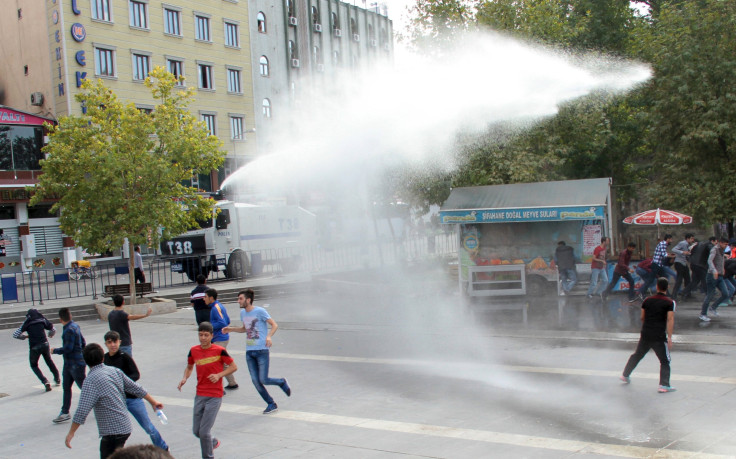Turkey's Fight Against Kurdish Militants, Islamic State Group Killing Its Economy?

Riots unfolded across southern Turkey as Prime Minister Ahmet Davutoglu blamed Monday an unprecedented suicide attack that killed at least 97 people in Ankara over the weekend on the Islamic State group. The escalating violence brought a protracted war that's been lingering on Turkey’s doorstep right to its heartland and raised new questions about the outlook of the Middle Eastern nation's increasingly weak economy.
“It would be very naïve to think that this type of situation has no effect on the economy,” said Sebnem Kalemli-Ozcan, a professor of economics at the University of Maryland who focuses on the Turkish economy. “These things go down at a faster speed when there’s political instability, and Turkey’s now going through one of its worst periods.”
Turkey has seen rising inflation, slowing growth, rising fiscal expenditures, growing unemployment and a loss of export competitiveness in recent months. The IMF expected the Turkish GDP to grow only 3 percent in 2015 and 2016, Foreign Policy reported in April. In a rare admission earlier this year, the country’s finance minister, Mehmet Sismek, said political instability posed the greatest risk to Turkey's financial future.
Ankara's economy has slumped almost parallel to rising instability in the country. Since a bombing in the southern Turkish city of Suruc in July, a decades-long war has reignited in the country’s southeast between Kurdish militants and the Turkish government. Kurdish militants immediately blamed the bombing, carried out by a supporter of ISIS, on the Turkish government for its failure to stem the spread of the militant group. Clashes between Kurds and Turkish security forces have been constant since, as the government has waged a two-pronged war: staging airstrikes against the Kurdistan Workers Party and cracking down on ISIS militants challenging Turkey from neighboring Syria, which has grappled with civil war for four years, sending millions of refugees across the border.
Turkey’s campaign against ISIS and ethnic Kurds in southern Turkey will likely put its national security at further risk and undo years of economic growth, said Gönül Tol, director of the Center for Turkish Studies at the Middle East Institute, a non-partisan think tank based in Washington, D.C. “Turkey’s slide into chaos is already hurting the country’s fragile economy, which just in this brief spurt of turmoil has seen the lira fall by about 4 percent,” she wrote in August.
While much of the fighting has been focused in the restive, and considerably poorer, southeast Kurdish region, Kalemli-Ozcan said foreign investors would likely still be uneasy about long-term financial prospects throughout the country.
“The perception of this right now, especially in the business community, is that this is all around the country,” she said. “Why would you be in such a country? There’s basically a civil war going on. In terms of investment, this [bombing] is going to have an effect if people don’t see some very decisive change in the foreign policy."
The economic downturn is new for Turkey, which experienced unprecedented economic growth in the beginning of the 2000s. During the first term of the Justice and Development Party (AKP), Turkey’s growth averaged 7.2 percent per year, making Turkey a highly successful economic performer in a region that experienced considerable economic turmoil during the same period.
But ahead of November's tense elections and amid a rising threat from ISIS across the border in Syria, Turkey appears more vulnerable to economic instability than it has been in years. The suicide bombs Saturday unfolded as hundreds gathered for a march organized by pro-Kurdish activists and civic groups to protest the government's attacks against Kurdistan Workers Party militants in the southeast. Critics accused Ankara of encouraging violence to shore up its support for the Nov. 1 vote. The government denied any such accusations.
"These attacks will not turn Turkey into a Syria," Davutoglu said Monday.
© Copyright IBTimes 2024. All rights reserved.





















